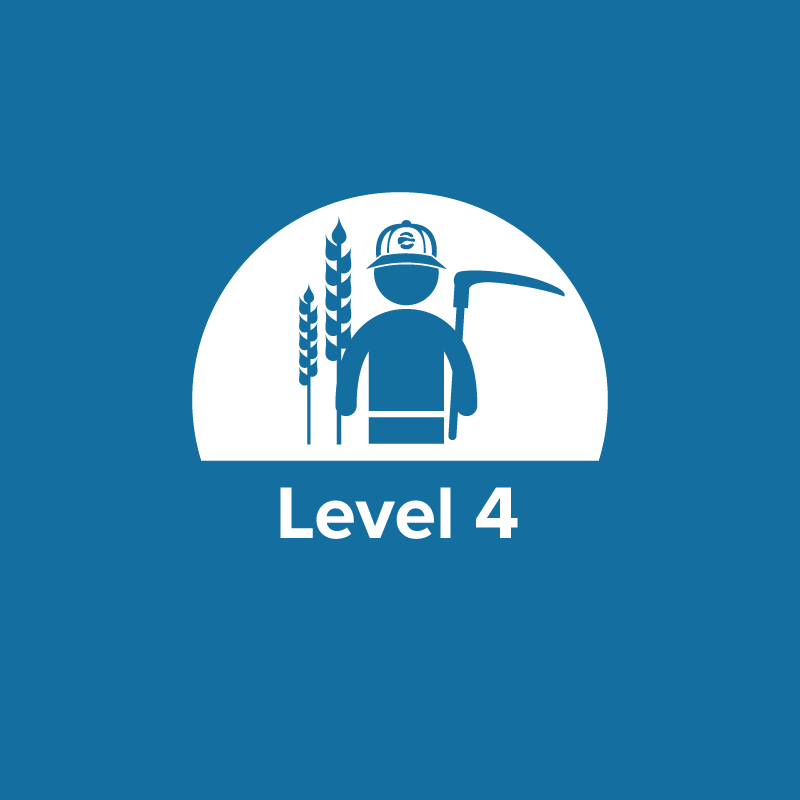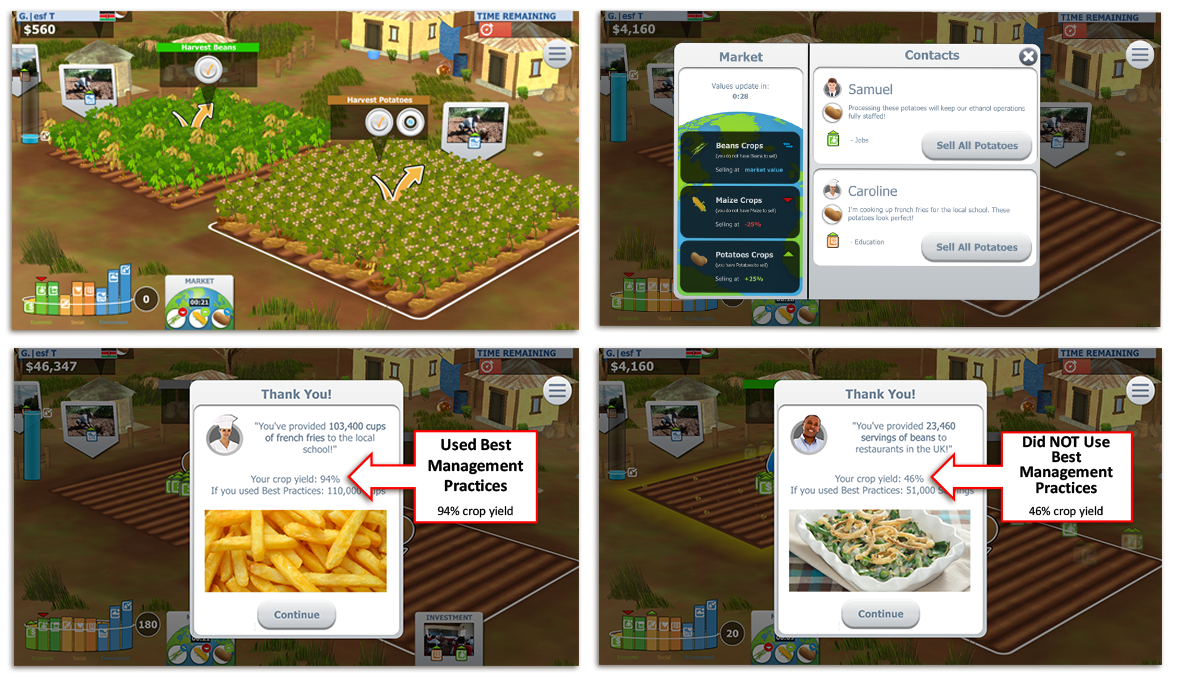Journey 2050 Lesson 4: Economies (Grades 9-12)
Students will explain why economics are important to sustainability, describe the relationship between a sustainable economy and the environment, develop a model demonstrating how agricultural production creates a ripple effect that impacts local and global economies and social stability, and discuss how investments build an economy.

Background
Lesson Activities
Recommended Companion Resources
Credits
Author
Lindsey Verhaeghe, Andrea Gardner, Debra Spielmaker, and Sara Hunt | National Center for Agricultural Literacy (NCAL) and Nutrien
Acknowledgements
The Journey 2050 program was originally developed by Nutrien in collaboration with Calgary Stampede, Alberta Canola Producers Commission, Nutrients for Life Foundation, and Agriculture in the Classroom Canada. Authors and contributors were drawn from each of these organizations under the direction of Lindsey Verhaeghe (Nutrien) and Robyn Kurbel (Calgary Stampede.) The lessons were updated and revised in 2017 and 2022 with contributions from the original J2050 Steering Committee, the National Center for Agricultural Literacy, and the National Agriculture in the Classroom Organization.
Standards
Texas Content Area Standards
-
Principles of Agriculture, Food, and Natural Resources: 130.2.c.1
The student demonstrates professional standards/employability skills as required by business and industry. The student is expected to:
- Principles of Agriculture, Food, and Natural Resources: 130.2.c.1.B: apply competencies related to resources, information, interpersonal skills, problem solving, critical thinking, and systems of operation in agriculture, food, and natural resources.
-
Principles of Agriculture, Food, and Natural Resources: 130.2.c.3
The student analyzes concepts related to global diversity. The student is expected to:
- Principles of Agriculture, Food, and Natural Resources: 130.2.c.3.A: compare and contrast global agricultural markets, currency, and trends.
- Principles of Agriculture, Food, and Natural Resources: 130.2.c.3.B: evaluate marketing factors and practices that impact the global markets.
-
Principles of Agriculture, Food, and Natural Resources: 130.2.c.4
The student explains the historical, current, and future significance of the agriculture, food, and natural resources industry. The student is expected to:
- Principles of Agriculture, Food, and Natural Resources: 130.2.c.4.B: analyze the scope of agriculture, food, and natural resources and its effect upon society.
- Principles of Agriculture, Food, and Natural Resources: 130.2.c.4.C: evaluate significant historical and current agriculture, food, and natural resources developments.
- Principles of Agriculture, Food, and Natural Resources: 130.2.c.4.F: compare and contrast issues impacting agriculture, food, and natural resources such as biotechnology, employment, safety, environment, and animal welfare issues.
- Principles, of Agriculture, Food, and Natural Resources: 130.2.c.4.D: identify potential future scenarios for agriculture, food, and natural resources systems, including global impacts.
-
Principles of Agriculture, Food, and Natural Resources: 130.2.c.6
The student demonstrates appropriate personal and communication skills. The student is expected to:
- Principles of Agriculture, Food, and Natural Resources: 130.2.c.6.A: demonstrate written and oral communication skills appropriate for formal and informal situations such as prepared and extemporaneous presentations.
- Principles of Agriculture, Food, and Natural Resources: 130.2.c.6.B: demonstrate effective listening skills appropriate for formal and informal situations.
-
Economics with Emphasis on the Free Enterprise System and Its Benefits: 113.31.c.1
Economics. The student understands the concepts of scarcity and opportunity costs.
- Economics with Emphasis on the Free Enterprise System and Its Benefits: 1.A: The student is expected to explain why scarcity and choice are basic economic problems faced by every society.
- Economics with Emphasis on the Free Enterprise System and Its Benefits: 1.B: The student is expected to describe how societies answer the basic economic questions: what to produce, how to produce, and for whom to produce.
- Economics with Emphasis on the Free Enterprise System and Its Benefits: 1.C: The student is expected to describe the economic factors of production: land, labor, capital, and entrepreneurship.
-
Economics with Emphasis on the Free Enterprise System and Its Benefits: 113.31.c.23
Social studies skills. The student uses problem-solving and decision-making skills, working independently with others.
- Economics with Emphasis on the Free Enterprise System and Its Benefits: 23: The student is expected to use problem-solving and decision-making processes to identify a problem, gather information, list and consider options, consider advantages and disadvantages, choose and implement a solution, and evaluate the effectiveness of the solution.
-
Agribusiness Management and Marketing: 130.4.c.5
The student defines and examines agribusiness management and marketing and its importance to the local and international economy. The student is expected to:
- Agribusiness Management and Marketing: 130.4.c.5.A: describe the roles and functions of management and leadership in agribusiness.
- Agribusiness Management and Marketing: 130.4.c.5.B: identify key economic principles of free enterprise.
- Agribusiness Management and Marketing: 130.4.c.5.C: analyze the economic opportunities of agribusiness.
-
Economics with Emphasis on the Free Enterprise System and Its Benefits: 113.31.c.2
Economics. The student understands the interaction of supply, demand, and price.
- Economics with Emphasis on the Free Enterprise System and Its Benefits: 2.A: The student is expected to understand the effect of changes in price on the quantity demanded and quantity supplied.
- Economics with Emphasis on the Free Enterprise System and Its Benefits: 2.B: The student is expected to identify the non-price determinants that create changes in supply and demand, which result in a new equilibrium price.
-
Economics with Emphasis on the Free Enterprise System and Its Benefits: 113.31.c.17
Personal financial literacy. The student understands the role of individuals in financial markets.
- Economics with Emphasis on the Free Enterprise System and Its Benefits: 17.A: The student is expected to assess ways to be a wise investor in the stock market and in other personal investment options such as developing a personal retirement plan.
-
English I: 110.36.c.1
Developing and sustaining foundational language skills: listening, speaking, discussion, and thinking--oral language. The student develops oral language through listening, speaking, and discussion.
- English I: 1.A: The student is expected to engage in meaningful and respectful discourse by listening actively, responding appropriately, and adjusting communication to audiences and purposes.
-
English II: 110.37.c.1
Developing and sustaining foundation language skills: listening, speaking, discussion, and thinking--oral language. The student develops oral language through listening, speaking, and discussion.
- English II: 1.A: The student is expected to engage in meaningful and respectful discourse by listening actively, responding appropriately, and adjusting communication to audiences and purposes.
-
English III: 110.38.c.1
Developing and sustaining foundational language skills: listening, speaking, discussion, and thinking--oral language. The student develops oral language through listening, speaking, and discussion.
- English III: 1.A: The student is expected to engage in meaningful and respectful discourse when evaluating the clarity and coherence of a speaker's message and critiquing the impact of a speaker's use of diction and syntax.
-
English IV: 110.39.c.1
Developing and sustaining foundational language skills: listening, speaking, discussion, and thinking--oral language. The student develops oral language through listening, speaking, and discussion.
- English IV: 1.A: The student is expected to engage in meaningful and respectful discourse when evaluating the clarity and coherence of a speaker's message and critiquing the impact of a speaker's use of diction, syntax, and rhetorical strategies.
-
Environmental Systems: 112.37.c.5
Science concepts. The student knows the interrelationships among the resources within the local environmental system.
- Environmental Systems: 5.C: The student is expected to document the use and conservation of both renewable and non-renewable resources as they pertain to sustainability.
- Environmental Systems: 5.E: The student is expected to analyze and evaluate the economic significance and interdependence of resources within the environmental system.
-
Environmental Systems: 112.50.c.6
Science concepts. The student knows the interrelationships among the resources within the local environmental system. The student is expected to:
- Environmental Systems: 112.50.c.6.C: document the use and conservation of both renewable and non-renewable resources as they pertain to sustainability
- Environmental Systems: 112.50.c.6.E: analyze and evaluate the economic significance and interdependence of resources within the local environmental system

